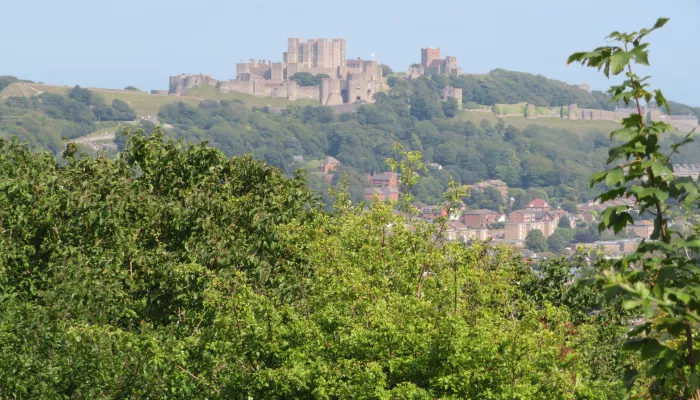What is Dover on the Defensive?
With thanks to Kent Coastal Communities Revival Fund, Kent Wildlife Trust is delighted to launch the Dover on the Defensive project in partnership with English Heritage.
The Project aims to conserve the ancient stonework and historic fortifications of Dover Castle while also supporting the species-rich chalk grassland on the surrounding landscape.
Why is this project important?
Chalk grassland, which will replace the secondary woodland, is a vital habitat for a vast number of species. The Dover area is well-known for its chalk grassland which makes up around 2.5% of the overall international resource. These areas are home to many iconic species such as the Adonis Blue butterfly and several varieties of Orchid.
Work will also be undertaken to ensure the stabilisation of sections of bedrock chalk and soil which have begun to erode. By repairing these areas, the Project aims to ensure that the historic fortifications, ditches and embankments around Dover Castle remain stable for many years to come.
Volunteering
The restoration of this vital habitat will be carried out by volunteers from the local community, providing them with the opportunity to gain new skills, including working with livestock, team leadership and a range of practical conservation skills. This knowledge will be transferable to other conservation efforts and will help to develop a growing network of volunteers supporting the wider conservation efforts of Dover’s heritage.
Nature is good for you!
The natural world has an impact on individual wellbeing – from flood prevention, clean air and water to having a peaceful natural space to be active. A connection with nature can have a significant positive impact including a reduction in stress and anxiety; increased positive mood, self-esteem and resilience; and increased feelings of social inclusion.
People with easy access to nature are three times more likely to be active, and 40% less likely to become overweight, which in turn can reduce the risk of other diseases and illnesses such as diabetes and some cancers. Taking notice of nature can encourage us to be more mindful and aware. Incorporating the five ways to wellbeing (Connect, Take Notice, Be Active, Learn and Give) into your life can lead to improved health and wellbeing…a Wilder Wellbeing.


